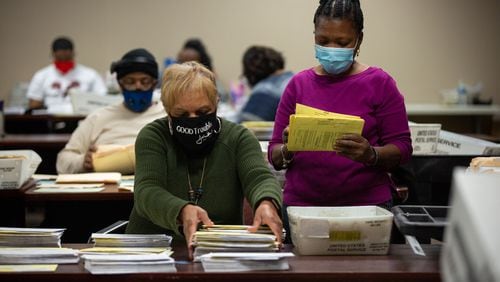Beller and other employees were closing the restaurant when three masked men entered. They tied employees up with electrical tape and forced Beller into an upstairs office to open the safe, then shot her in the shoulder. She died of her injuries.
Two suspects have since been taken into custody. As a direct result of the death at Barcelona, the Georgia Restaurant Association (GRA) hosted a Jan. 9 seminar on best practices for restaurant security, employee safety, active shooter preparedness and effective crisis communications.
Some 50 stakeholds attended the event, which was open to restaurant owners and operators.
Speaking to the group was a six-person panel that included ADT Security expert Susanna Rohm, along with others working in risk management, security, public relations and law enforcement.
Rohm spoke about critical security devices, such as panic buttons that silently dispatch police in an emergency. The catch: These tools are only good if employees know where they are located and how to use them.
Michele Stumpe, a Georgia liability attorney who focuses her practice on the hospitality and retail industries, explained the basic legal responsibility that restaurants bear when it comes to security.
“Under the Georgia negligence standard, you, as a business owner, have an obligation to exercise ordinary care to protect your invitees – people who are invited onto your premises, like your customers and your employees – from foreseeable risks of harm,” Stumpe said.
The second standard, Stumpe explained, comes from the Occupational Safety and Health Administration (OSHA), which requires that restaurant operators provide their employees “with a place of employment that is free from reasonable hazards likely to cause death or a serious physical harm.”
Then she framed such standards within the wake of the Barcelona incident.
“Twenty, 25 years ago, it would have been really easy for me to go into court and to say that this situation – an active shooter situation – was not ‘reasonably foreseeable.’ And there really wasn’t an obligation for my restaurant to prepare. … We pretty much are now all in a ‘reasonably foreseeable’ [situation] – We’ve all been put on notice. This can happen. It does happen.”
In recent years, according to Stumpe, courts around the country have begun to view an active shooter situation or a gang-type crime situation as a “reasonable hazard” within the definition of OSHA. It means businesses have an obligation to exercise “ordinary care” to protect against that type of hazard.
Marsh Risk consultant Renata Elias, who specializes in emergency and crisis management, says staff trainng is crucial so that in the heat of a crisis, employees can protect themselves and guests.
Security expert Rob Strickland and local law enforcement detective Jared Watkins spoke about the value of community partnerships. Both urge restaurant employees to know their neighbors and cleaning crew and to keep police aware of concerns and incidents.
Moderator Naomi Green of The Giving Kitchen asked the panel about the proper response in an active shooter situation.
“Run. Get away from the situation if you can,” detective Watkins said. But, he cautioned, each situation is going to dictate a different response. “These are not all cookie-cutter situations. If someone is pointing a gun at you, running may not be an option.”
The restaurant industry currently employs 14.7 million people who comprise 10 percent of the overall U.S workforce, according to the National Restaurant Association. Half of all adults have worked in the restaurant industry at some point in their lives.
Soon after the Barcelona incident, Paul Cantrell, an acquaintance of Beller who also works in the restaurant industry and blogs for My Darling Atlanta, posted a story on that site urging restaurants to ramp up security measures to better ensure the safety of their employees In particular, he argued the case for hiring off-duty police officers for night security. He also proposed that businesses go cashless, a security measure that Connecticut-based Barteca Restaurant Group has since put into place at its Barcelona Wine Bar and Bartaco locations in Atlanta.
It takes money and time for a restaurant to put into place emergency action plans, to maintain security and to train its employees for a crisis situation.
I’d also venture to say that the 50 people attending the session agree that the investment is essential.
That’s not enough, though. The GRA notified everyone on its Atlanta-based restaurant email list – 500 recipients that include people who own or manage a metro Atlanta restaurant or bar – about the seminar. Roughly 80 people RSVPed; 50 attended.
There are more than 17,000 food service and drinking places in Georgia that employ 438,900 people, according to the GRA. It’s going to take operators from each of these places to commit to the safety of its workforce.
When 29-year-old Chelsea died, I immediately thought about a friend of mine who worked at a wine bar just a couple blocks from her apartment in St. Louis. We were both young, single, in our 20s and believed the world was ours for the making. At the end of the day, what worried her most was closing time when she had to walk those two streets home, in tact - with herself and her tips.
“This moment presents us all an opportunity to begin a fully transparent dialogue within this industry,” blogger Cantrell wrote back in December. “Seize this moment to organize and reform the way we take care of each other in this industry.”
The GRA’s safety seminar was a first step. GRA plans follow-up event in February in partnership with the Atlanta Convention & Visitors Bureau.
Let’s hope these talks result in positive action before another bullet is fired inside a restaurant.







